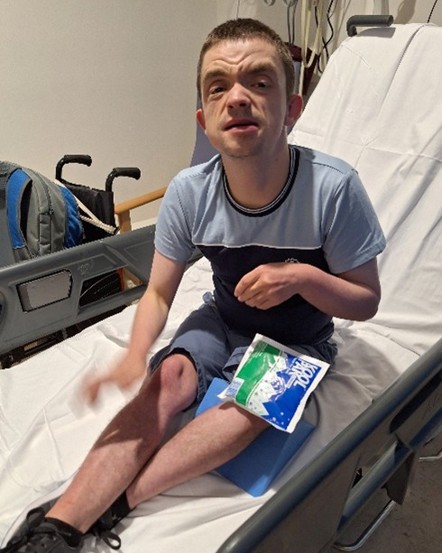Relationship Advice Part 2 of 3: To Parents Dealing with a New Cerebral Palsy Diagnosis

Kara Melissa
International school teacher turned stay-at-home mom. World traveller, food maker, writer, quilt maker, dreamer, activist, advocate, and part-time opt...
Memory 1
We are sitting in a bright room around a long rectangle table. My mom is on one side of me and my husband, Ali, is on the other. I’ve been in a room like this before. Where doctors take you to tell you their news in private. The last time was when my brother, Josh, died. This time there was a big file on the table in front of our doctor.
A file that large for a baby so young. My baby. He probably talked about the notes in the file. I don't remember.
I only remember the words 'cerebral palsy'.
We walked out, arms around each other. Shocked. Almost unfeeling.
We said nothing but went to the sink to wash our hands again before going into the room where our son was sleeping, still hooked up to machines, though far fewer than in the beginning.
He was moving from the NICU to the SCIBU (Special Care Intensive Baby Unit).
A graduation of sorts. A milestone not found in your 'What to Expect when You're Expecting' bible.
Memory 2
It is dark. Ali and I are sitting on the bunk next to Sebastian's cot in the SCIBU. We are facing each other. I'm imagining a severely disabled child in a huge, oversized wheelchair.
An image likely taken from some movie or ad. Not from a real life reference. Because I didn't know anyone in a wheelchair. I didn't know anyone with cerebral palsy. We are looking at each other.
He says incredulously 'Cerebral palsy? What does they even mean?' We embrace and both start crying. 'I don't know,' I say, with that image in my mind. 'I don't know.'
Although we knew before leaving the hospital Sebastian may have cerebral palsy, we didn’t have an official diagnosis until he was 3 months old.
At 5 months old we had the specific diagnosis of dystonic CP. At 10 months old we told the world about it. That was our first step towards acceptance.
I'm not one to routinely dole out advice. But I will tell you a few things that work for us. Keep us sane, happy, and in love. With ourselves, each other and our family.
--Take time to grieve. Know that it can come in waves. It's OK. Things are not what you imagined they would be. It will take time. But don't stay here too long. Help each other move forward.
--Have a sense of humour. At least one of you needs it. For us, it is my husband. He makes me laugh, even when I don't want to. He finds the humour in a situation that doesn't seem to have one. Sometimes it's for me.
But really, I think it's mostly for him.
--Listen to each other. Whether it's about a new diagnosis (there are always more after the first one), how your day went, or even the score of the basketball game.
Being available to listen is huge. Whether it's a five-minute phone call at work to vent or a twenty-minute discussion after the kids are in bed about something happening at school or in the office, or wherever.
It validates your feelings and supports your team effort at tackling anything and everything.
--Go out. Together. Alone. With friends. This can be tough. You might not have family or someone else you trust nearby to watch your kiddo while you have a date night.
Until you do, have date night at home. Treat yourselves to takeout and a new movie rental. Have an impromptu dance party in the living room.
Invite friends over after the kids are in bed. Making sure you both get out for 'you' time is huge too.
However often repeated, it's very true: if you don't take care of yourself, how will you take care of your child?
--Have an outlet. Whether it's writing or playing basketball. Watching movies, comedy sitcoms, or sports games. Sewing quilts or cardio with a punching bag. Do something to take a break from your reality. Enhance your reality. Find a way to channel your emotions. Good and bad. Happy and sad.
--Go on an adventure. Or a holiday. If the funds aren't there to get out of town then explore your city or take a day trip.
It might take some extra planning depending on your child's needs, but it will be worth it.
--Talk to other families with children whose diagnoses are similar to your child's. Share that information with each other. Some of my closest friends are those I've only met once or online who have first born sons with similar birth stories and diagnoses. In the early days, it saved me. And I'm pretty sure that saved my husband.
--Acceptance. It's possible you won't get there together. But it's important to get there. It's the only way to move forward.
Our son has mixed/dystonic cerebral palsy. It affects his entire body.
Severely.
He cannot walk or talk. He will always have cerebral palsy. Because of cerebral palsy he has epilepsy and reflux.
More recently his hips are moving out of place. He also has a g-tube and takes several medications. Sebastian is five and a half. He loves his little sister and laughs at her all the time because she is very silly.
He wants a pet dog and loves reading books and playing Go Fish with his family.
He loves dance parties and prefers speed to caution when in his Red Racer (wheelchair).
He has his dad's sense of humour and my sense of adventure.
He's an awesome big brother. He's learning how to go potty on his special toilet which encourages his little sister to do it too.
He has inch-stones and milestones in his own time.
We love him fiercely. We accept him for who he is and we include him in everything. Are there modifications? Yes. But we still go places and enjoy life.
We make it happen. One day at a time.


